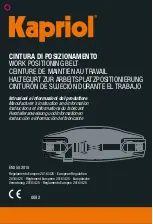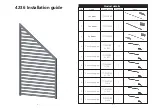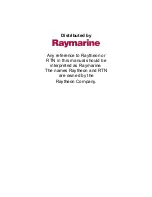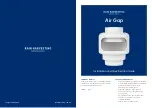
9
DMX-512 Control
Fixtures require a "Start Address" from 1 to 512, setting the first DMX channel containing data
for the fixture (see DMX Background). Before addressing fixtures, consult the manual of the
system’s DMX controller to select a desirable addressing scheme. Valid Start Addresses range
from 1 to 512. Fixtures requiring more than one channel for control will read subsequent
channels up to the total number of channels required. Since this fixture requires a maximum of
10 channels of DMX, if set to a Start Address of 11 it would use data from channels: 11, 12, 13,
14, 15, 16, 17, 18, 19, and 20. Choose a Start Address so the channels used do not overlap
with other fixtures. In some cases, it may be desirable to set two or more same type fixtures to
the same Start Address. In this case, the fixtures will be slaved together and respond to the
same data. Because all fixtures see the same data, fixtures may be set to any address without
concern for the order they are connected by the DMX cables.
DMX Data Connection
This fixture uses 3 pin or 5 pin XLR type connectors. For data use shielded twisted pair
cable approved for EIA-422/EIA485 use. Fixtures are connected in Daisy Chain
topography: Connection is made from the controller to the DMX-IN of the first light, then
from the DMX-OUT to the DMX-IN of the next light and so on. Only one data source can
be on a chain and no branching is allowed. The physical order in which the fixtures are
connected is not important, use the most convenient.
Data Terminator
A Data Terminator can be connected to the DMX-OUT of the last fixture
to reduce the effects of signal noise; it is not required for all installations.
To make a Terminator, connect a 120-ohm ¼ watt resistor across pin 2,
Data Negative (S-) and pin 3, Data positive (S+). A qualified technician
can determine if a Data Terminator is needed.
Adapter
5-to-3 pin
Systems using 5 pin DMX interfaces can be accommodated by purchasing 3-to-5 pin
adapters or building adapter cables. Numbers designating each pin can be found on
connectors. Converting between the two XLR types is done in a pin-to-pin fashion.
Connect the shields to pin 1, then connect pin 2 to pin 2 and pin 3 to pin 3, regardless of
either connector’s gender or pin count. No connection is made to Pins 4 & 5.
DMX-OUT
1
2
3
- Ground
- Signal (-)
- Signal (+)
XLR Connector - Socket:
DMX-IN
1
2
3
- Ground
- Signal (-)
- Signal (+)
XLR Connector - Plug:


































